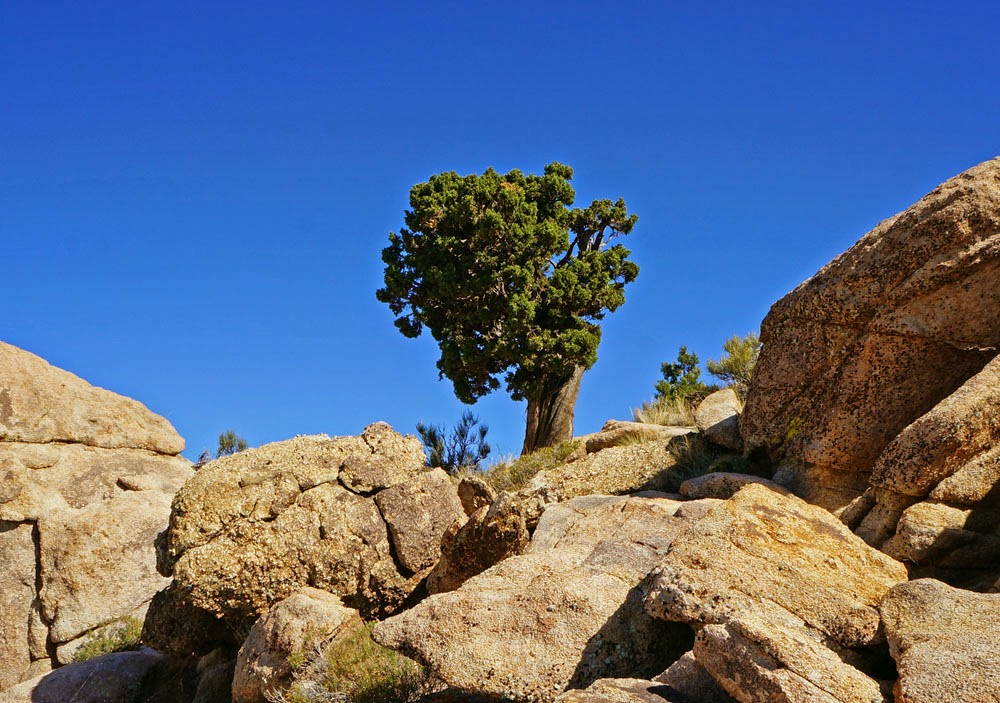 |
| In Mojave National Preserve, in the north central area, rises a graceful granite arch called Cima Dome. |
Deep under the Earth's surface, 180 to 80 million years ago,
magma crept slowly into a space it created for itself under great pressure. A granite pluton was formed—a body of igneous
rock slowly cooling below the surface. The
magma flowed, then cooled in an almost perfect cone with very gently sloping
sides.
Its presence raised the rock above, and by raising it, exposed
it to erosion. So smoothly and gently
did the pluton do its work that the overlying material has completely eroded
away, leaving the granite so gently sloped that deep gullies have not
formed. Contours on a map are near
circles on a shield-shaped upland dome, twelve miles in diameter and 1500 feet
high above the desert floor. You cannot
even see its cone shape except from far away as in the above picture.
Notice on the left slope of Cima Dome, a rock peak about the
same height as the Dome. It’s called Teutonia
Peak and that’s where I headed. The
picture at the left shows the peak from halfway up the trail.
 |
| Cut Stones from Machu Picchu |
 |
| Urinal Rock |
The granite pluton is weathering gracefully now, feeling the sun and rain, into shapes I recognize and have given names.
And on the very top, a hat, neatly and symmetrically placed, in keeping with the shape of Cima Dome.











So, I'm reading, maybe half asleep and you write "And up on the final rock scramble to the summit, a lone juniper clings to a crag." ... And, me, in my squinty-eyed, sleepy time evening self, just sitting on this chair in front of mesmerizing computer screen, starts looking for the 'lone JUMPER' wondering all the while 'who' is out there with you. Sigh, rest will probably improve my reading skills.
ReplyDeleteYou 'do' manage to slip in those funnies ~ love your 'naming' of the rock formations ~ thanks for the chuckles.
And, don't worry, I don't have any hiking boots. this Starshine travels on stardust in flip floppy shoes not designed for rescue, but there are those we could 'call,' right? 'Desert Busters' maybe? Best bet is just to stay safe.
Laughing with you and enjoying the ride from here.
Junnie
Junnie, "You 'do' manage to slip in those funnies " and so do you. Interesting the things we notice on the verge of sleep or when the blood all drains out of the brain to service the physical effort of climbing. Things will look different in the morning.
DeleteSuch a beautiful photo of the cactus with ultra blue sky, floating fish shaped clouds and luminous sun. It looks like a desert version of a Maxfield Parrish painting...such rich resonant color. Ahhhhhh.
ReplyDeleteYes, Susan, light is more vivid out here where little obstructs it. Colors are more pure. The desert brings me down to basics.
DeleteReading this after a quick glance yesterday, when we all read the next one... I love especially the magic hand of juniper against the deep blue sky--it really looks like a hand to me,,, (not stand) but maybe because it is just one special one. I clicked and stared and it is still a hand... and I am not even tired!
ReplyDeleteYou may have it, the juniper hand. To me it is short, thick-trunked, ready to hold on to the rock for a lot longer, built to stand up for the long haul.
DeleteI've been to most of these places (except the atomic testing museum). I seem to have some trouble getting into a blog site, so I'm trying various profiles unwilling to write much until I find something that gets through.
ReplyDeleteWell I guess that worked. This is Lee, I always look at your pictures but I've had some trouble blogging. There are more sand dune fields in So. California than most people realize. Some like Kelso or Eureka in Death Valley N.P. are kept vehicle free, while others like Dumont or the Algodones in Imperial Co are allowed to have lots of dune buggies. Glamis even sells T shirts. Have you heard the dunes "singing"? There I asked a question, now you can reply and I'll know I'm getting through.
ReplyDeleteYes, Lee, you are getting through. It is fine to comment as "Annonymous," as long as you give your name in the comment. I will send this via email too, so you know it got through. My only suggestion is to place your comment on the most recent post, the one for 10/14 called "My Sordid Past," unless you want to address a particular post, as you have done here. Good to hear from you.
DeleteYes I have heard of the singing, especially in Kelso Dunes, but I did hear any singing when I was there. You may recall from my bicycle ride from Del Rio, Texas to home, that I passed through Glamis and and the dunes near there.
I got printed. This is Lee Collins again. The naked desert rocks are like suggestive sculptures that beg for names. Look how they always name rocks on Mars. There's a book I saw once on rock climbing that gives cute names to every single one of hundreds of the rock formations (like Star Trek Rock divided into Kirk, Spock rock, etc.) and how best to climb each one.
ReplyDelete